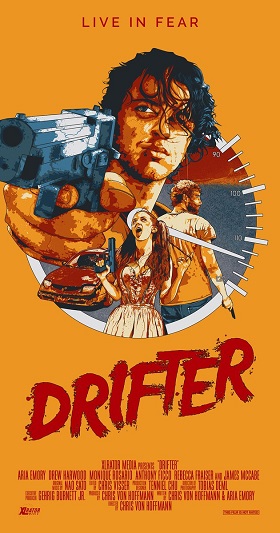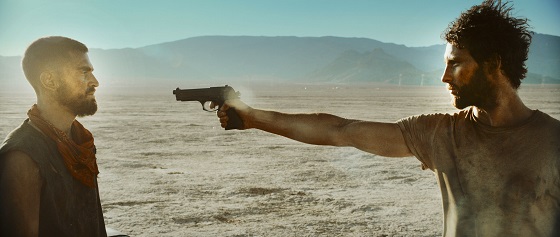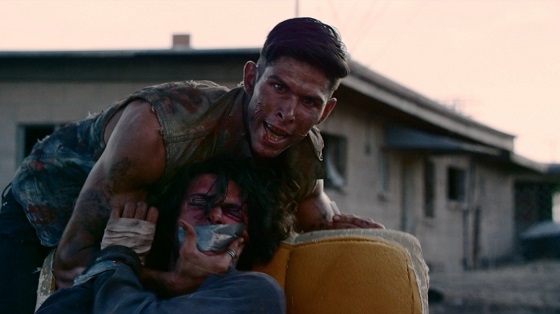[Rock Fist Way Down]
A half-baked homage highlight reel that knows where it wants to go, yet not how to get there or what to do once it is at its destination, Drifter is a movie without purpose or a soul. Stocked with cardboard cut-outs of characters with all the depth of a cereal bowl, the film bounces between one murder to the next with the casual inevitability of an Atari game of Pong played at the slowest possible speed.
Drifter meanders through its 85-minute runtime with characters that aren’t defined, in a universe with even less structure, barreling towards a hazy objective quickly discarded. It offers up two main characters that the audience never really gets to know, in a post-apocalyptic world that is barely introduced, and throws it all into a psycho-hillbilly stew that is all sizzle and no substance. And while clever homages and call-backs to much better films abound, Drifter never rises to the level of any of them in its attempt to create something unique.
Drifter opens with two murderous brothers on the road, one of them with a bullet hole in his palm wrapped in duct tape: yet From Dusk Till Dawn this movie is not. While the latter Tarantino-Rodriguez effort established a good-cop/bad-cop dynamic between its leads with hostages to raise the stakes and invest the audience, Drifter does nothing of the sort. After a quick murder to kick things off, the more dominant brother in Drifter, Dom (Drew Harwood), reminds his sibling Miles (Aria Emory) that they are on the road to track down the man who stabbed their father. And that is it: they’re brothers, one is stronger/more capable than the other, and they are looking for the guy that carved up their dad. Neither Dom nor Miles are particularly endearing, and except for the fact that they share a sense of pride in avenging the man who sired them, the audience never learns anything of substance about them.
During this same conversation, Dom also mentions that the world is “a wasteland, there are no more rules, people do whatever they want,” which is as close as Drifter comes to defining the reality of this universe. And this is a problem, as these words could mean anything depending on one’s life outlook, and the events of the picture hinge on the post-apocalyptic nature of this setting. Society seems to have broken down a-la The Road, yet at times it appears that things like electricity and television are still functional. This world and these contradictions don’t need to be explained to the audience outright, but subtle hints sprinkled throughout the film to clue the viewer into the gist of things (i.e., an old newspaper headline, gas generators, etc.) would have gone a long way towards defining the rules of this world and the brothers’ place in it.
And while the boiler-plate revenge mission might have been interesting if the film had taken the time to define the reality of this universe (if it’s the apocalypse, presumably being out on the road is dangerous), the setting is never defined and the story is thus robbed of any urgency or purpose. Beta versions of the primary antagonists appear early on, yet are dispatched with such ease that it is difficult to invest in the looming danger of this world. All of this combined with the lack of familiarity and/or sympathy with its main characters leaves the audience disengaged when the second act rolls and the primary villains arrive. Indeed, by the time the movie starts threatening Dom and Miles in earnest, it’s hard to care, and even more difficult to appreciate.
Miles does little except bleed and complain, and Dom’s only redeeming quality is that he loves his brother. Why should the audience care about them? Again, in From Dusk Till Dawn, the movie attached a few innocent hostages to the admittedly nasty protagonists, which allowed viewers to invest in the outcome of things while drawing out the redeemable qualities of the leads. The danger of the story was clearly defined and appreciable, and relatable character development and back-stories kept the audience engaged.
None of this is at play in Drifter; it plays with some interesting ideas, hinting at a House of 1000 Corpses meets the first half of From Dusk Till Dawn mash-up, but unfolds like a rushed film school exercise wherein the writer-director just can’t wait to get to the juicy bits. These failings fall almost entirely on the script, which sounds like it was written by a middle schooler whose first language isn’t English. If this were the case, one could almost excuse the anemic plot and a line like, “now get out of the car before I blow the fuck out of you,” yet New Jersey native and director/co-writer Chris von Hoffmann can hardly claim this exception.
It’s hard not to feel bad for the people involved in the production of Drifter, as the set design, wardrobe, makeup, cinematography, lighting, and music (minus the cartoonish stingers) demonstrate good craftsmanship. The actors seem to be doing the best they can with the little that’s provided, yet von Hoffmann doesn’t appear to know how to properly utilize any of it. As things wrap up, Drifter lurches towards the only real conclusion on the table, and despite a decent Texas Chainsaw Massacre call-back, it limps to an ending devoid of suspense or creativity. A decent turn by James McCabe as murder-town mayor Doyle provides a little flair in an otherwise dreary and rote cinematic psycho hillbilly exercise, yet that’s about the limit of the picture’s promise as-written.
Ultimately, Doyle and the smattering of horror homages sprinkled throughout Drifter can’t rescue the picture any more than an umbrella can save a skydiver. They exist as assets only in theory rather than in any practical or meaningful application, and provide Drifter with nothing to keep it from plunging at terminal velocity towards a grounded reality ready to destroy it.
Drifter is in theaters today and on VOD and iTunes on February 28.









Comments on this entry are closed.